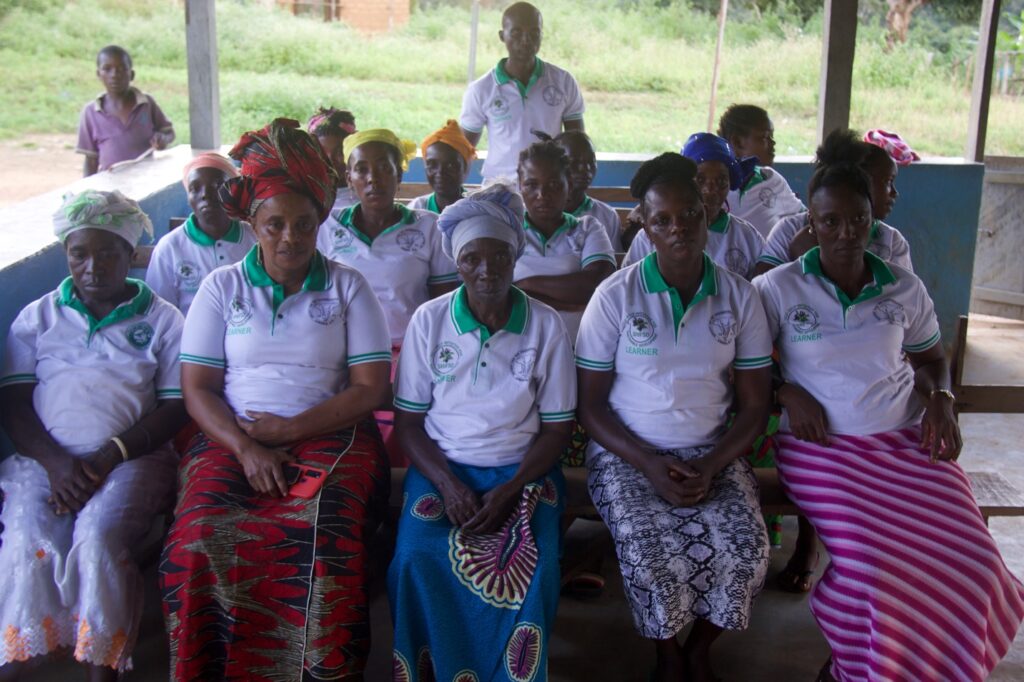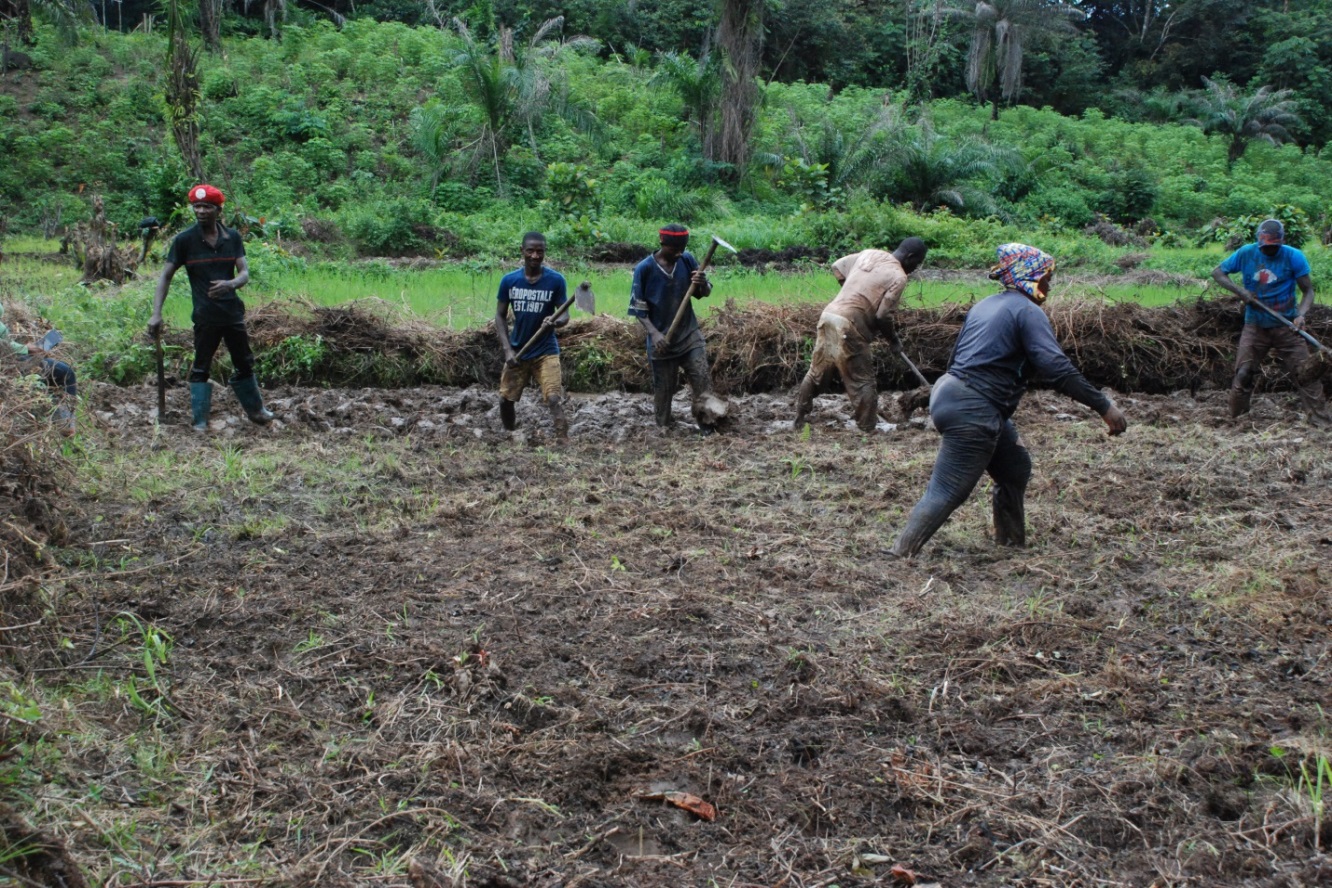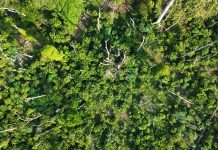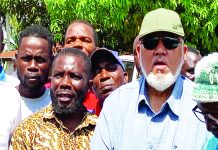Banner Image: Locals plow a swampland to plant rice Kumgbor. The DayLight/Varney Kamara
By Varney Kamara
KONGBA, Gbarpolu County – For more than a decade, Mary Jusu traded bushmeat in Kumgbor. In 2017, a group of conservation campaigners encouraged her to turn to lowland farming in order to protect the Gola National Park near her village. Four years on, she is now helping to protect the very animals whose meat she illegally sold for a living.
“[It] is better than the bushmeat business because there is no stealing and stress in it,” Jusu, 33, tells The DayLight in an interview, adding she generates L$6,000 from rice and beans harvest, which enables her to support her family.
Like Jusu, Mustapha Jalloh is a former illicit miner in Kumgbor. Jalloh, 48, mined diamonds in this region for nearly a decade. In 2015, he quit mining after he took a security guard job with a conservation group.
“Unlike my security job which gives me a monthly pay of US$130, there’s no guarantee that a diamond will be found at the end of every month,” Jalloh says. “This is one reason for which I left mining. There’s no job security in mining. The work is hard, risky, and full of uncertainty.”
Jusu and Mustapha are part of sustainable livelihood programs aimed at protecting the Gola National Park. They are two of nearly 1,000 inhabitants here in Tonglay and Norman, the neighboring clan that is benefiting from a sustainable livelihood program in the Kongba District of this western Liberian county. The Society for the Conservation of Nature of Liberia (SCNL) supports the locals with tools, training, and mentorship in a variety of agricultural endeavors. Its overall objective is to ensure that the park remains protected against illegal occupants.
Measuring 88,000 hectares of forestland across Liberia’s northwestern frontier toward its border with Sierra Leone, the Gola National Park is home to a variety of endangered and endemic plant and animal species, including western red colobus monkeys, Diana monkeys, and pygmy hippopotamus. It was created by law in October 2017 and is one of Africa’s most important biodiversity hotspots, accounting for over 60 plant and animal species. However, poaching and illegal mining have resulted in habitat loss and increased vulnerability of wildlife in the area. Liberia’s wildlife law prohibits unauthorized entry into a national but only a few people have been arrested for violation of the law. It is a member of the Convention on International Trade in Endangered Species of Wild Fauna and Flora (CITES), an international treaty between governments, which ensures that international trade in wildlife does not threaten the survival of species.
“One of our primary objectives is to ensure that the people are made aware of the importance of protecting their forest,” says Michael Tarie, SCNL’s program manager, in an interview with The DayLight. “The overall goal is to keep the forest protected while at the same time providing alternative livelihoods for these forest inhabitants.”
“This is part of a broader local and international efforts aimed at driving the region away from its war legacy to a new future focused on conservation and climate solutions.”


SCNL’s swamp rice program involves Jusu and 59 other villagers. Jalloh works with the NGO’s local office here. Several villages are also engaged in fish farming, and about 120 in cocoa production. The Beekeeping section has 247 villagers enrolled, while 110 of them are occupied with groundnuts farming. A total of 205 townspeople are also part of an adult literacy program, while 135 are a microfinance scheme.
“Most of the trainees are catching up well with the new farming methods and skills training programs that we have introduced here. They are excited and upbeat about them,” says Hawa Mohammed, a former ranger of the Gola forest, who now supervises the trainees.
“I am happy because I am no longer going in the bush to earn my living,” Korpo Fiyah, a former gardener in Kumgbor, who felled trees and burned them to make a plot. “The bush work is too hard. It has lots of pains in it.”
The programs are not just about livelihoods. It also involves adult literacy aimed at getting women’s participation in career development programs that will keep them away from activities that endanger the park.
“This will prepare women to speak on issues that affect them in their communities,” says Rufus Boygeh, a campaigner with the Self-Help Initiative for Sustainable Development (SHIFSD) following the graduation of 34 women from the program. “It will empower them and lead them to self-sufficiency and would make them speak out on matters that help to protect their forest and the environment.”





Facebook Comments